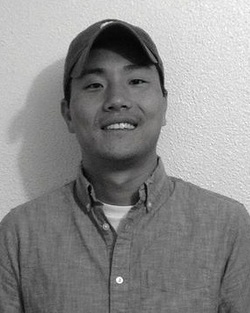
Mark L. Keats Q & A with Eastern Iowa Review
Chila: You provided us with an interesting, what I would call experimental, essay, "Meditations and Fragments: An Enchiridion for Reflecting on Death." How did that come about?
Mark: First, thanks again so much for accepting the piece! This essay was written in my graduate nonfiction workshop last spring, so I'm in debt to my professor and classmates. Our professor, Katie Cortese, asked us to consider various styles and forms throughout the semester. For this essay, I was thinking of the shaped essay. To be honest, I had no idea what I was going to write about. When I received word that my father had passed, I didn't know how to feel, what to do, who to talk with. I had never really had a relationship with him and I hadn't spoken with him in over a decade. It felt too soon to write about, but at the same time, I was constantly confronted with this one question: How do we mourn family members with whom we don't really have a relationship? The shape idea initially came as an instruction booklet for how to build a basketball hoop, because that's the one positive memory I have of my father. But after more thinking, writing, and failing, I thought about a guide to handling death through various meditations and fragments, because my memory of my father is so fragmented.
Chila: The work includes a number of quotes, and a drawing! From initial seed thought to fully-edited-and-ready-to-send-out-for-publication, how long did the entire process take?
Mark: I think it took about two months of daily writing, thinking, and editing. It was one of the few pieces I can remember where I became really obsessed with trying to get it right. I did the drawing for a friend, so, luckily, I already had that.
Chila: Talk about your educational journey.
Mark: I started at Howard Community College when I was 19. I earned my BA in Japanese from the University of Maryland, College Park in 2005 and my MFA from the same school in 2007. I then worked as a part-time English instructor, beginning at HCC in 2008 before entering the PhD program in English and Creative Writing at Texas Tech in 2014. When I began at HCC, I never thought I'd be pursuing a PhD. I find it funny at times to be here. But I'm appreciative of all the wonderful opportunities afforded me while continuing on this path.
Chila: You work with a literary journal. Tell us about that, if you would. And how do you juggle time between that and your educational pursuits? Other hobbies that also take a slice of your leftover hours?
Mark: I'm a managing editor at Iron Horse [Literary Review - Texas Tech University] now. I was an associate editor last year. It's a wonderful experience to see how a literary journal functions from this end. Of course, it is a lot of hard work, as I'm sure you know. But it is wonderful to see a piece go from a submission to an accepted piece. Instead of teaching two courses per semester, I work ten hours a week in the Iron Horse office and teach one section of creative writing. I'm also finishing up course work. I'd say I've dropped those juggling balls a few times and I'm someone who can easily become overwhelmed and not get anything done. However, my wife always has me think of priorities for school work and my own work, which helps alleviates the semester madness. Besides being a PhD student and new husband, I'm a runner and a happy owner of a rescue dog, Boston, who also loves to go running.
Chila: I'm fascinated by heritage, probably because I was born in Germany to a German mother, and also have Irish, English, and First American (Cherokee) genes from my father's side. Your heritage is addressed somewhat in your essay. Can you enlighten readers about that a little here?
Mark: Great question! I'm also interested in heritage and identities. I'm a Korean adoptee. I was born in South Korea in 1980 and adopted to the states in 1983 to what I would define as a working class Catholic family. I have two (one older and one younger) brothers, both of whom are biologically related. Despite searching exhaustively, I've never been able to find much more information about my Korean family. But, I did find out about the Keats family during a research assignment. Sadly, to the best of my knowledge and research, we're not related to the poet, John Keats. But, we are related to some of the earliest settlers in Virginia, dating all the way to the 1620s, which I think is pretty interesting.
Chila: Yes, it is! Okay, last question: If you had the chance to sit with one living author for an hour over a favorite beverage, who would you choose and why, and what would you talk about?
Mark: That's a wonderful and tough question! I would say Haruki Murakami over some really good coffee. Murakami's The Wind-Up Bird Chronicle is one of those books that changed my life, and I just love how Murakami, while at a baseball game, simply decided to become a novelist. While I think I'd probably want to badger him on his writing and revision process, I also think I'd like to just ask him about everyday things like his favorite place to run, his favorite music, his favorite food. And I'd want to thank him for really getting me excited about reading novels.
_____________
Many thanks to Mark for both his hard-won essay and this closer look at his personal life and writing. ~Chila
Mark L. Keats' work has appeared or is forthcoming in Foundling Review, Clockhouse, Smokelong Quarterly, and many others.